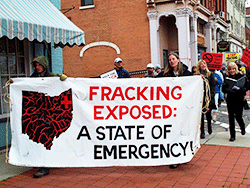
Meanwhile, important policy decisions about energy, oil, gas, and the generating of electricity are being made every day. Decisions about whether more cross-country pipelines should be built, or what is the proper way to dispose of coal ash have a huge effect on rural and low income communities.
A pressing issue in recent weeks is what to do with the waste products that result from hydrofracking. Fracking wastewater, which is brought to the surface after drilling and fracking a well, contains potentially harmful levels of dangerous contaminants, including heavy metals, carcinogens, and radioactive materials.
The oil and gas industry wants to ship toxic fracking waste down the Ohio and Mississippi rivers, major sources for drinking water in the Midwest. Three million people get their drinking water from the Ohio River, and 18 million people from the Mississippi River. Millions upon millions of gallons of this waste is being generated every year, especially in Pennsylvannia, and the fracking industry wants to use barges to transport the toxic waste to downriver dump sites in Ohio, Louisiana, and Texas.
In late February, frontline community groups were outraged to learn that the U.S. Coast Guard has decided to use 40-year-old regulations that don't address hydraulic fracking waste. Barges carry almost 60 times as many gallons of wastewater as trucks. A shipping accident would release thousands of gallons of toxic contaminants directly into waterways. Such a spill would be nearly impossible to clean up, putting the drinking water of millions of Americans at risk.
The Coast Guard says it will allow these shipments on a “case-by-case“ basis, but has set up the process to be as opaque as possible. Citizens, local governments, and even water providers will not be allowed to know what is on the barges.
Local groups like Buckeye Forest Council are asking the Coast Guard to immediately ban fracking waste shipments on our nation’s waterways as a long term solution to keep our drinking water safe. The Council believes that the Coast Guard is abandoning its policy, which would have required laboratory analysis and identification of fracked oil and gas drilling waste before shipping. Several groups are working to get their voice heard through petitions and letters to the Coast Guard.
One wonders: with all the concern for and genuine harm that the residents of Flint, MI, Hoosick, NY and the schoolchildren of Newark, and Ithaca are experiencing from unsafe drinking water, how can the Coast Guard respond with such a tin ear? This certainly seems like a gross dereliction of the sacred duty of the Coast Guard to defend our nation's waterways.
(Photo: Protestors march against fracking in Ohio; Credit: Bill Baker, CC BY-NC-ND 2.0)






Comments